Today, Amnesty International released its annual report on the use of the death penalty worldwide. Although 2013 saw more executions than in previous years and several countries resuming executions, there was also progress towards abolition in all regions of the world. Below, see the top 10 things you need to know from our newest report:
Tag Archives: fair trials
Read the Letter: What We Want President Obama to Do in Saudi Arabia
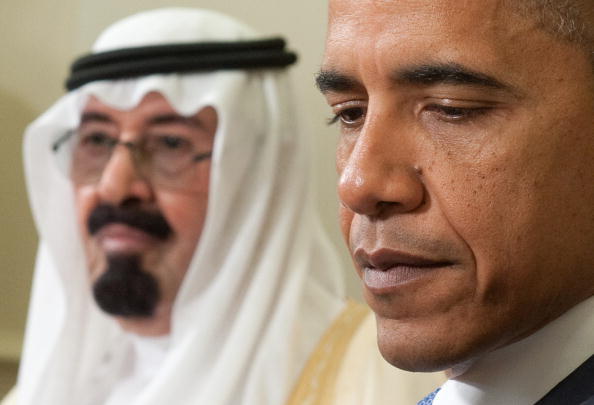
President Obama with King Abdullah of Saudi Arabia during meetings in the Oval Office at the White House in Washington on June 29, 2010 (Photo Credit: Saul Loeb/AFP/Getty Images).
On Friday, President Obama is expected to visit Saudi Arabia, a country whose government is highly repressive. But instead of raising human rights, Obama’s trip has been described by The New York Times as focused on “fence-mending.”
This is the wrong approach.
As we say in our Amnesty International letter to President Obama:
For too long, the U.S. has put geopolitics and access to energy over support for human rights in its relationship with Saudi Arabia. As an ally of the United States, Saudi Arabia has been spared the blunt criticisms that U.S. officials make of other governments that commit serious human rights violations.
5 Death Penalty Myths Debunked

In advance of the release of our 2014 Global Death Penalty Report tomorrow, here are 5 of the most common misconceptions about the death penalty.
MYTH #1
The death penalty deters violent crime and makes society safer.
FACT
There is no convincing evidence that the death penalty has a unique deterrent effect.
More than three decades after abolishing the death penalty, Canada’s murder rate remains over one third lower than it was in 1976.
Changing Hearts and Minds in India
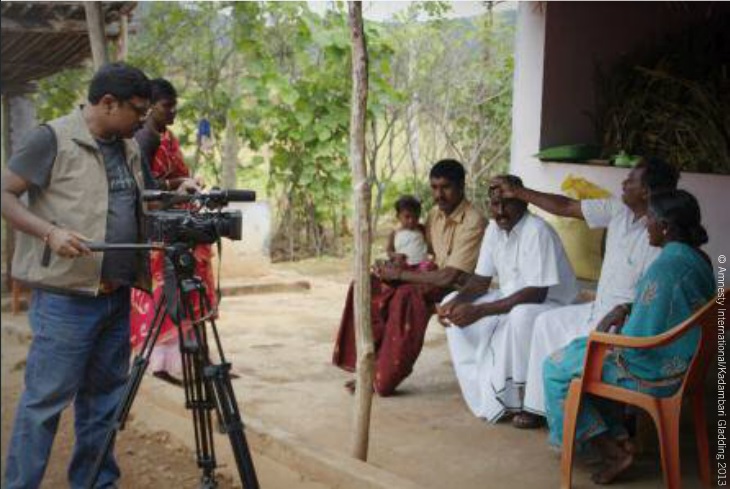
Amnesty staff in India speak to Gnanapragasam, one of the four men sentenced to death in 2002 in south India. All four had their sentences commuted to life on January 21, 2014 (Photo Credit: Amnesty International).
EDITOR’S NOTE: On Wednesday, Amnesty International will release its 2014 global Death Penalty report. Some believe that using the death penalty is fine as long as the public supports it. But history is littered with human rights violations that were supported by the majority, but were subsequently looked upon with horror, such as slavery, racial segregation and lynching. Here, independent filmmaker and Amnesty India Campaigner Kadambari Gladding, discusses turning the tide of public option in India, where public option increasingly favors the death penalty.
“A murder for murder cannot be justice,” Mani told me as we walked down the corridor of the school he went to with his friend Simon some four decades ago. Mani still lives in the same village, while Simon has been on death row for nearly 10 years. Mani is a quiet person, but some things – like the death penalty – move him to rare, long conversations.
Crimea: A Culture of Fear, Made in Russia

People wave Russian and Soviet flags as they look at fireworks in the center of the Crimean city of Sevastopol celebrating the annexation of the peninsula by Russia (Photo Credit: Viktor Drachev/AFP/Getty Images).
This post originally appeared in Foreign Policy under the title “A Culture of Fear, Made in Russia.”
By Salil Shetty, Amnesty International Secretary General
Two decades of stuttering human rights reform in Ukraine was almost scuppered overnight when, on January 16 this year, the Parliament in Kiev railroaded through a raft of new legislation to restrict the freedoms of expression, association and assembly.
A virtual carbon-copy of laws adopted in neighboring Russia in recent years, they were tailor-made to give the Ukrainian authorities increased powers to prosecute those involved in the anti-government protests in Kiev’s central Maydan Square, as well as silence dissent more widely.
BREAKING: New Hampshire House Votes to Repeal Capital Punishment
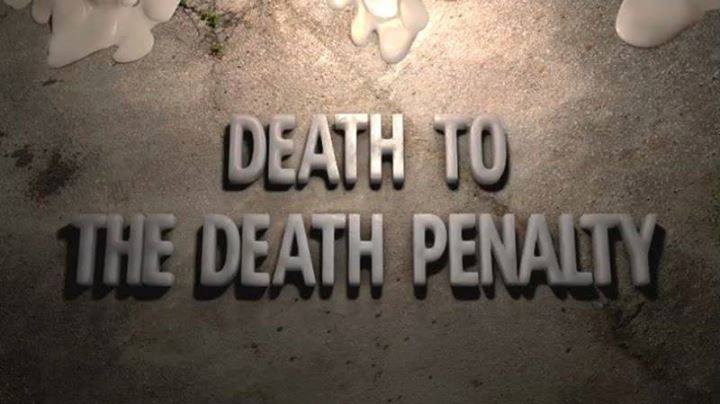
Back when I served as a death row attorney, I experienced first hand that the death penalty is anything but just. I was there at the trial of Bill Andrews when a note reading ‘Hang the N*****’ was found in the jury’s lunchroom. I saw people die by lethal injection and the electric chair who I believed were innocent.
But victories like today’s remind me that the tide is turning for the death penalty in America.
Today, we came one step closer to a significant victory when the New Hampshire House voted to repeal capital punishment in the state.
Executing Innocents: What We Can Learn From Glenn Ford
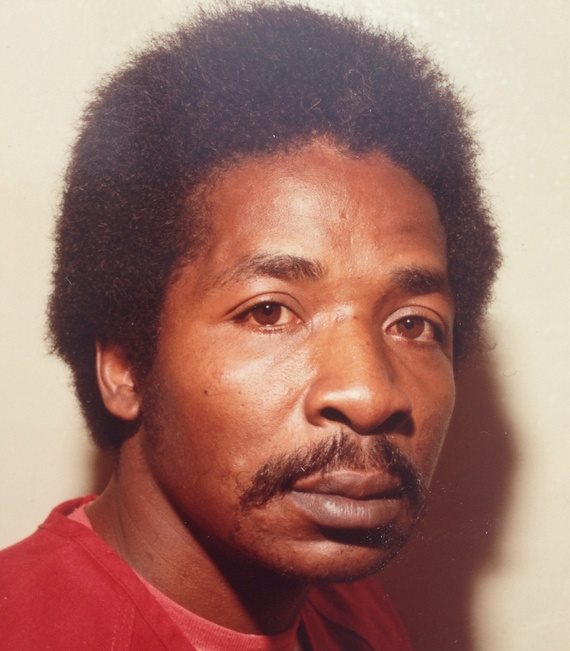
Glenn Ford (pictured here in 1984) is living proof of just how flawed our justice system truly is (Photo Credit: Private).
By Tessa Murphy, USA Campaigner at Amnesty International
There are two lessons the U.S. should learn from the release of Glenn Ford, a 64-year-old man who spent 28 years on death row in Louisiana for a crime he didn’t commit.
The first lesson is that the death penalty is never the answer, including because it carries the inescapable risk of executing innocent people. The second is that there are some serious problems with Louisiana’s justice system.
Glenn Ford walked out of the southern state’s infamous Angola prison late yesterday, after spending nearly three decades behind bars for a crime he’s always claimed he never committed.
The Death Penalty is Just the Tip of an Iceberg of Injustice

We have ended the death penalty in two thirds of the countries around the world and in 18 states in the United States. On Wednesday, New Hampshire may get a bit closer to becoming the 19th (Photo Credit: Mike Simons/Getty Images).
This post originally appeared in the Huffington Post under the title, “The Death Penalty Is The Tip of an Iceberg of Injustice.”
For much of my working, adult life, I have been witness to the consequences of our country’s addiction to the death penalty, and to the damage it does even as we loosen its grip.
This week, we at Amnesty International USA and anti-death penalty activists around the country hope to witness a moment we will one day say was another important step towards our collective recovery.
Wednesday, March 12, the New Hampshire House of Representatives will vote on a bill that, when signed into law, would end the death penalty in the state. Thirty-two states throughout this country have yet to rid themselves of a punishment that is not just cruel, unfair and expensive, but is tainted with human error.
“I Believe Them to be Innocent”: Teenie Rogers on the Men Accused of Killing Her Husband
For nearly a decade, Teenie Rogers has been fighting for justice – but not in the way you might suspect.
In 1972 and ’73, three men were convicted of her husband’s murder and placed in solitary confinement following the murder. Together they are known as the “Angola 3.”
In a bizarre turn of events Teenie found herself fighting for justice – not just for her husband – but also for the men convicted of his murder.
A Long Ride: Rev. Reynolds and Vera Thomas’ Journey Seeking Justice For Their Son
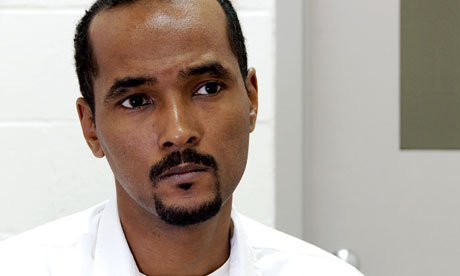
Reggie Clemons (Photo Credit: Private).
By Meredith Reese, Amnesty International USA’s Missouri State Death Penalty Abolition Coordinator
In the early morning hours of February 4th, Reggie Clemons’ parents found themselves once again preparing for a long ride across the state of Missouri to yet another court hearing. This one was to be held in Jefferson City in front of the Missouri State Supreme Court and has been a long time coming.
Reggie’s parents were joined by a large enthusiastic group of supporters who gathered 130 miles away in Saint Louis, in the gray, pre-dawn light to board a bus for the long ride to Jefferson City. Many of them taking off work, skipping school and losing countless hours of precious sleep between them, just to be there for this crucial moment.